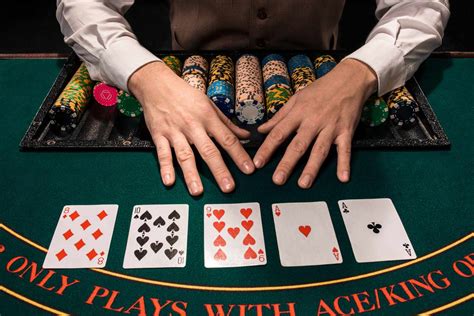One of the newest casino table games popping up in casinos across the country is the "Texas Hold'em Bonus" game. Simply, it pits each player against the dealer in heads-up hands of Texas Hold'em poker. Whoever has the best five-card poker hand at the end, wins.
As in Blackjack, you only have to beat the dealer's hand to win, not the other players at the table. If you're familiar with how to play Texas Hold'em, it should be a snap to understand & sit down and play. Here are the basic rules:
- To start playing, each player puts up an ante wager, and has the option of putting up a bonus jackpot wager as well.
- Each player and the dealer are dealt two cards, face-down. These are the hole cards.
- If you want to play your hand, you put down a bet that's exactly twice the amount of your ante. In other words, if your ante bet was $5 and you want to play, you have to put down exactly $10. If you decide not to play and fold, you lose your ante bet.
- The dealer deals three cards face-up in the center of the table. This is also known as the flop. These three cards are community cards, meaning all players can (and will) use them to make their final five-card hand.
- Players now have the option to bet again, and can only bet the same amount as the ante (so if the ante was $5, the bet is $5 this time). Or players can check, which means they don't bet. You don't have to bet — you get to keep playing whether you bet or check.
- A fourth community card is dealt face-up. This is also known as the turn.
- Again, players can bet or check. The bet is again the same amount as the ante.
- If dealer beats you then you lose all your bet, if you beat dealer then you get paid the sum of your blind and subsequent bet.
However, there are two exceptions regarding the payout for a five-card hand:
- If the dealer has a weaker hand than a pair of 4, then this is a "no game" and he pays you only the blind bet regardless of if you win or not.
- If you have straight, full house or better then you are usually paid more than 1:1 of your bets.
Strategy and Analysis
Some players may think that this game seriously favors the player. Thinking in a simple way — let's say the blind bet is $5. As if the player plays every hand, then he and dealer has equal chance of winning $15. Now the player even has an option to pay only a third of the total bet (i.e. pass at three) to stop the game — and I think it is reasonable to assume the player makes correct decision 50% of the time at least.
(i.e. namely that if the player decides to pass 10 games then he would lose more than 5 if he did not stop) it just makes me think I would much rather be the player than the dealer. The only thing I am not sure about this analysis is how the 'no game' rule affects the probability.
Can You Beat the Casino?
According to a Reddit post, the house edge (i.e. the average win percentage for the casino assuming perfect play from the player) is between 2.0 and 2.5%. Note that perfect play does not have the exact same meaning you provide. Perfect play means calling (paying the extra $10 in your example) whenever he has more than 50% chance of winning given the information available.
The casino's advantage comes from the risking $15 only after he has seen all the cards, unlike the player that must decide whether to risk $15 knowing only 5 cards.
